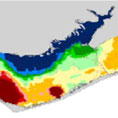You are here: Home › Ecological Forecasting Programs

Ecological Forecasting
Aquatic and terrestrial ecosystems in the U.S. produce over $230 billion in consumer goods annually as well providing intangible services such as clean air and water, reducing pollution, and drought and flood prevention. Ecosystems also provide the public with venues for recreational opportunities. In order to sustain the delivery of these goods and services, it is critical that we can anticipate how natural and human stresses to the environment will affect the Nation's ecosystems. Ecological forecasts can be used to predict the effects that biological, chemical, physical, and human-induced changes will have on ecosystems and their components.
NOAA has recently identified the development of ecological forecasting capabilities to support ecosystem approaches to management as one of its highest priorities. CSCOR has been at the forefront of ecological forecasting since its Coastal Ocean Program established predictive outcomes as its primary organizing principle for supported research more than a decade ago. CSCOR is committed to providing resource manager with the modeling tools and predictive capabilities necessary to support ecosystem approaches to management. Ecological forecasts (i.e., the capability to predict the effects and interactions of environmental variability and anthropogenic stressors on coastal ecosystems, and the impacts of management actions on ecosystems and coastal economies) help improve communication between management and science, help set the scientific priorities to address management concerns, and ultimately help managers make better decisions.
Ecological forecasting is a driving force in all of CSCOR's current research programs as described below. It is also an emerging priority across NOS, as a component of NOS' modeling activities. CSCOR recently led a substantial effort to prioritize new modeling activities across NOS, resulting in the following report:
In addition to directed research programs, CSCOR has supported workshops and symposia to develop modeling capacity. An example is a series of workshops held in 2006-2007 that focused on assessing the skill of coupled physical – ecological models. By gaining understanding of how well a model functions, managers are better able to evaluate and use the model output.
EcoForecasting Program
In FY 2004, CSCOR launched a targeted ecological forecasting (EcoFore) program to solicit collaborative proposals between management agencies and research institutions to develop predictive capabilities for coastal ecosystems impacted by natural and anthropogenic stressors (e.g., climate change, extreme natural events, pollution, invasive species, and land and resource use). The EcoFore program intends to continue to stimulate such work with another call for proposals for FY06. More
Coral Reefs
CSCOR's coral reef research programs primarily contribute to the understanding of coral reef ecosystem function and use the results of their research to develop predictive tools, such as ecological forecasting models and data syntheses for decision making, to assist local resource managers in evaluating ecosystem health as a result of ecological stressors (e.g. climate change, coastal land-use, invasive species, extreme events, pollution, etc.). Such tools typically follow alternative management actions in order to assess and prioritize management strategies. More
Climate Change
CSCOR has established a research program to look at the response of ecosystems to long-term variation in climate. Changes in climate can lead to fluctuations of sea level with a direct effect on coastal lands as well as changes in the abundance and distribution of valuable fisheries stocks. One of the goals CSCOR's climate change research is to develop ecological forecasting models that will help coastal and fisheries managers design and implement management strategies that will mitigate the potential impacts of climate change. More
Land Use Impacts
CSCOR's research on land and resource use facilitates the development of ecological forecasting models as tools for decision makers, allowing coastal managers to better predict future environmental conditions using current conditions and various management scenarios. Timely ecological forecasts can provide coastal managers with practical information for better ecosystem management in the face of cumulative impacts of multiple land use activities. CSCOR projects that currently involve understanding impacts of land use on coastal ecosystems include a multiple stressor study in the Barataria watershed of Louisiana, South Florida restoration effects on Florida Bay, hypoxia research in the northern Gulf of Mexico and other U.S. coastal areas, and the use of fish as model animals exposure to hazardous environmental contaminants. More
Harmful Algal Blooms
The variety of harmful algal bloom (HAB) species, their broad geographic distribution, and the breadth of their impact on different ecosystem components create complex resource management issues that often require complex, integrative approaches to address them. A primary focus of CSCOR's HAB research is the development of e cological forecasts as integrative predictive tools to assist coastal managers in planning and implementing management strategies related to HAB events. More
Hypoxia & Nutrient Pollution
CSCOR's hypoxia and nutrient pollution research provides results and predictive tools which enable coastal resource managers to make informed, proactive, and scientifically based decisions to help mitigate the impact of these stressors on aquatic ecosystems. Ecological forecasts using indicators of coastal ecosystem habitat health and sustainability allow managers to understand how hypoxia and nutrient pollution affect the structure and function of coastal ecosystems and evaluate the effectiveness of mitigation and restoration strategies.

